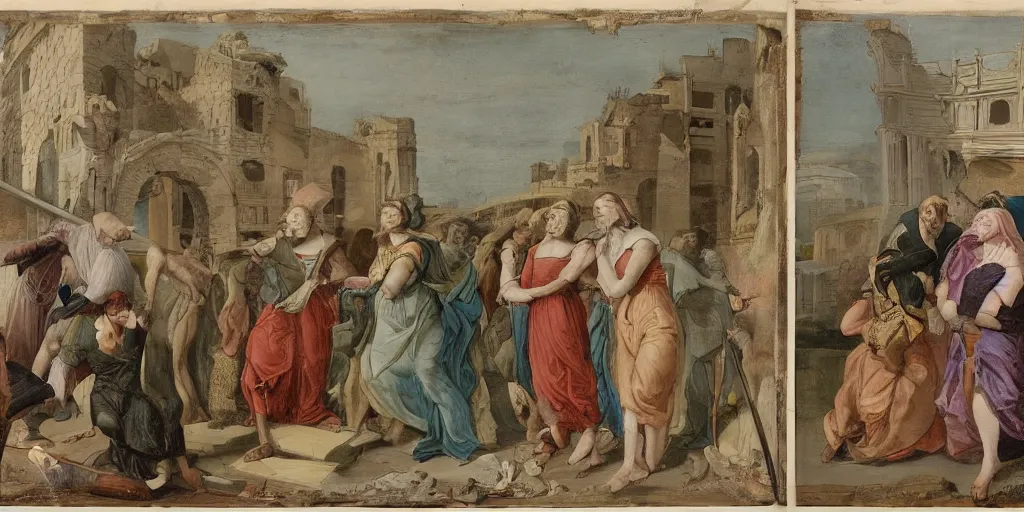
Image: twitter.com
Throughout history, mankind has been plagued by countless conflicts born from ancient grudges and simmering resentments. These toxic embers can smolder for centuries, demanding justice and retribution for perceived slights. In turn, the pressure may erupt into a destructive maelstrom of violence and rebellion, consumed by the insatiable thirst for revenge and restitution. Today, the echoes of these ancient grudges continue to haunt modern society, fueling bitter conflicts and threatening peace. By exploring the deep-rooted causes of hostility and rebellion, we gain valuable insights into the human psyche and pave the way towards understanding and addressing present-day conflicts more effectively.
This article delves into an exploration of the many faces of grudge-fueled conflicts, dissecting their historical evolution, unraveling their insidious consequences, and shedding light on possible pathways towards reconciliation and healing. Drawing from real-life case studies, the article reveals the hidden wounds that fester beneath the surface, shaping the course of human history and human relations.
The Genesis of Grudges
The foundation of a grudge often lies in feelings of injustice or injury. These grievances, fueled by real or perceived harm, can plant the seeds of bitterness that linger over time. Ancient grudges frequently stem from territorial disputes, leadership struggles, betrayals of trust, or perceived cultural grievances. In the absence of proper resolution, these grievances transform into psychological burdens, borne and passed down through generations, becoming deeply ingrained in collective memory and identity.
Ignorance, prejudice, and discrimination contribute significantly to the nurturing of grudges and resentment. For instance, generations of tension between nations, ethnicities, or factions within communities derive sustenance from historical incidents, which antagonists employ to propagate an “us-versus-them” mentality.
Unveiling the Hydra of Conflict
Grudges manifest in diverse forms, each engendering particular actions and outcomes. They can manifest as cycles of revenge, with each act of reprisal feeding a bloodthirsty vendetta. Such spirals of violence, like a hydra growing more heads for each vanquished, perpetuate hatred and inflict countless casualties.
Collective experiences of victimization can create deep-seated sentiments of grievance and adversarial narratives that justify violent redress or militant resistance. Ruthless persecutions, territorial annexations, historical atrocities, and systematic oppression imprint enduring hatreds upon the collective memory, fueling enduring conflicts.
Economic Plights and Disparities
Socioeconomic factors play a pivotal role in shaping the dynamics of grudges and rebellions. Inequality, exploitation, and deprivation are fertile ground for resentment and rebellion. Those immersed in hardship may grow weary of oppression and exploitation, forging deep resentments against perceived benefactors, powers that be, or societal structures. Such conditions become a petri dish for violence when desperation and frustration engulf rationale.
Harsh economic policies, resource depletion conflicts, food shortages, and environmental disasters exacerbate dormant discontent, galvanizing populations towards open revolt. Extortions, scams, and pervasive feelings of socio-economic injustice can translate into general anger and fury, burgeoning into violent defiance.
The Weight of History and the Dynamics of Oppression
Historical experiences of oppression, colonial rule, and enforced marginalization nurture resentments that endure generations. Broken covenants, political double-crosses, and denied rights create deep-seated consequences that live well past their inception. These grievances empower cycles of rage, empowering endemic rebellions as a counter-reaction to historical injustices and inequitable systems sustained over time.
Oppressive regimes, intent on maintaining their authority, can fuel these conflicts. To crush resistance, oppressive regimes use repressive tactics such as violence, arbitrary detentions, censorship, mass media manipulation, and economic sanctions. In the eyes of the oppressed, such depredations are perceived as attacks on their very existence, instilling a fiercely defiant spirit and fostering a bedrock of rebellion.
Reconciliation: Paths to Healing
Mending shattered relations is a daunting journey, with no sovereign solution applicable across all scenarios. A multi-pronged strategy embracing empathy, dialogue, justice, forgiveness, and accountability can initiate a path toward convalescence.
Sustained contact between previously divided populations encourages dispositional changes and dismantles stereotypical barricades. Positive interactions over shared interests and cooperative efforts can help gratify the need for reconciliation. Instead of clinging to polarized positions, cultivating a mutually acceptable midpoint offers a potent platform for coming together.
Promoting dialogues and encouraging conversations centered around contentious problems can pry open deep-rooted beliefs and establish a receptive environment for divergent perspectives. Honesty, transparency, and empathy can create the atmosphere required for genuine exchange and potentially pave the way for durable accords.
Conclusion
Ancient grudges and present upheavals are intricately intertwined. Examining these connections provides valuable insight into the perpetuations of conflicts, enabling us to search for dynamic solutions capable of transforming aggression into understanding. By addressing underlying grievances, upholding accountability, fostering dialogue, and promoting equality, we increase the probability of durable peace and reconciliation.

Image: openart.ai
From Ancient Grudge Break To New Mutiny